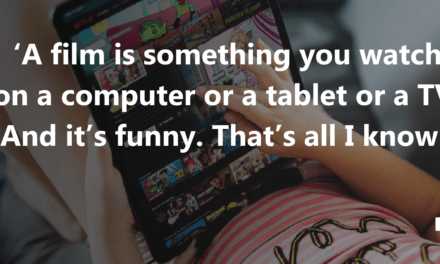So what will be the future of the internet? Is it a glorious new frontier that can never become a border, an ever-expanding sphere of meaning that is generated permissively and received chaotically? Or is it an increasingly controlled domain, centralized not only by state fiat but corporate advertising and consumer animation?
One answer to these questions lies in an unlikely area: football on television. More specifically, what is happening to ESPN, which is owned by Disney; Fox, Sky, and News Corporation, which are under the control of Rupert Murdoch and his unskilled offspring; and BT, a publicly-traded company.
We’ve just learnt that ESPN is becoming less global. It looks as though the sports network is selling its London headquarters and 86ing its British staff.
The reason is that the telecommunications company BT, formerly British Telecom, which doesn’t have a television network, outbid the House of Mouse’s sporting subsidiary for the rights to TV coverage of England and Wales’ Barclays Premier League. This occurred after Fox/Sky/News Corp had won away from ESPN the rights to internet replays of goals ‘near-live’.
There could be some new space available to run such material, what with the Dirty Digger avowing that his Sun newspaper may eschew Page 3 girls. Who knows? Perhaps they’ll be replaced by Shinji Kagawa hat tricks (though Uncle Rupert is considering what he calls a ‘halfway house with glamorous fashionistas’ as a substitute for page 3).
Meanwhile, BT is very proud of its new purchase and has paraded its feelings on the delightfully-named “Life’s a Pitch”.(For corporate information on the new initiative, see here.) BT is also renowned, by the way, for what is known colloquially as ‘data pimping.’ This involves internet service providers collecting information about what users click on, then selling the data to consumer research firms. Confronted with massively negative responses, the company has apparently withdrawn from this activity. We can only hazard a guess at how much customer surveillance goes on each time we click and view.
But I digress—though not very far. Back to sport. Tragically, the Dirty Digger has lost the rights to screen the Barclays Premier League in the US. For just as our great benefactor is starting a national US sporting network intended to rival ESPN, NBC has purchased the crucial raw material that his association football channels, Fox Soccer Channel and Fox Soccer Plus, rely on. ‘The Peacock’ is setting up its own sporting system on cable, which no doubt will also become central to coverage of the Olympics when they haul into view, and saves costs by not bothering with the very expensive rights to Major League Baseball.
What does all this signify?
It is part of a massive, incomplete project as the sands and tealeaves of television shift in recognition that the great early 21st-century corporate takeover of the internet depends on the very thing that produced the great late 20th-century corporate takeover of television.
In 1996, Murdoch famously said sport was the ‘battering ram’ that would facilitate his global domination of TV. By putting the medium’s most popular genre behind a pay wall and requiring followers to subscribe to his communications services, namely satellite and cable, in order to watch it, Murdoch turned a love of football into a need for dishes and boxes.
But the internet is not like television, I hear you cry. It is multi-directional. But what if the internet can be consolidated into a sealed set, for all the world like the fatal blow dealt to Brechtian and union ideas about radio from the 1930s?
That period saw German and Australian union-owned stations pioneering choral response, two-way radio. It was a dream of worker-actor collaboration across the ether. Then the system was comprehensively corporatized. Two-way dreams were dispatched to the margins, as the radio set was sealed and the airwaves zoned (Brecht, 1979-80; Johnson, 1988).
How far away from that fate is the internet? Those lapsed sacerdotal zealots of the new media Chris Anderson and Michael Wolff, from the suddenly-venerable Wired magazine, say the web is dead, because social networks and software applications are supplanting the old fantasy of an open frontier. Instead, a new hegemony of guides and leaders operates inside a small number of institutions.
It took them until three years ago to work out that the history of communications might come in handy for understanding and predicting things. A pity they and so many other boosters somehow failed to read Jim Carey (1988 and 2005). Oh, I forgot, media academics don’t know anything of worth unless they’re zealots of newness or fans of shows. Silly me.
Perhaps we are seeing very similar things today to the developments of the 1930s, when revised radio norms came into play. Touching, affecting cybertarian passions are easily engaged by the superficially open architecture of the internet. But a skeptical historical eye turned towards this supposedly new world finds a wry repeat of an unworthy past.
New technologies offer grand utopias that are remorselessly reiterated by unsuspecting legatees, along with their eventual demise. This time it won’t involve sealing a set and making it capable only of reception. It may involve sealing access to football and making that conditional on people buying subscriptions, undergoing surveillance, and going through the corporate media for quick and easy access. That would be a very different future from the one many desire.
Toby Miller is Professor of Cultural Industries within the Department of Creative Practice and Enterprise, City University, London. You can follow his misadventures at tobymiller.org and the ‘culturalstudies’ podcast on iTunes or as an application for your smartphone.





